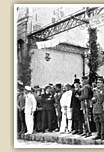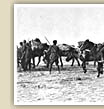|
|
 |
 |
 |
 |
 |
 |
 |
 |
 |
 |
|
After the failure of the Conference, Greece has to face the dilemma, both military and diplomatic,
whether to advance inland as far as Ankara, in order to strike a blow at the heart of Kemal lands, or to adopt a defensive policy along the line determined by the Treaty.
|

Finally an aggressive policy was chosen on political grounds. In May 1921 King Constantine, with his
staff, went to Smyrna. In June a meeting was held in Kordelio that regulated the last details of the
offensive, whereas at the same time the Allies proposed the suspension of operations, a proposal that was rejected by the Greek side.
Thus, in summer of 1921 the Greek offensive was launched from four points, with the ultimate goal of
capturing Ankara. The Greek army marched as far as Kutahya, in the hope of encircling the Turkish army
that had withdrawn into the hinterland. The meeting in Kutahya under the presidency of Constantine
opted for a further advance, despite suggestions and recommendations to the contrary. The Greek army advanced and reached the River Sakarya. The bloody Battle of Sakarya River finally checked the
aggresive progress of the Greek army, which eventually retreated to the Eski Shehir-Kutahya-Afyon Karahisar line,
where it was immobilized for a year. Kemal managed to draw the Greeks far from their sources of
supply, thus making their front more and more vulnerable in the event of an offensive, while the morale of the army,
pinned in a hostile land, was likely to be low.
In October 1921 Dimitrios Gounaris began a tour of the European capitals in order to
contract a loan and convene a conference in order to achieve a peaceful outcome to the Asia Minor operations.
France was increasingly opposed to such Greek attempts, Great Britain appeared to be more conciliatory.
|
 |

Kemal himself, now with the advantage, proposed a peace but only if
Smyrna be granted to Turkey, Thrace acquire local autonomy and war indemnities be paid.
The Greek government turned down these terms and the war continued.
In March 1922 the new Allied Conference was held in Paris, where the clear military
impasse of the Asia Minor issue was matched by a diplomatic impasse as well. The representatives
of the Allies suggested terms to both sides in an attempt to bring the whole matter to a final
settlement and to convene a conference for the terms of peace. The proposals of the Allies
practically removed from Greece all the territorial gains of the Treaty of Sevres,
whereas the fate of the Greek populations of Asia Minor appeared precarious.
In any case, Kemal's refusal to negotiate removed the
dilemma of the Greek government as to whether or not to accept the allied proposals.
In the summer of 1922 the Greeks turned to two desperate initiatives: the first one
aimed to create an autonomous Asia Minor state with Smyrna as its centre under Turkish sovereignty,
founded on the basis of cooperation between Christians and Muslims. The second
was a proposal to capture Constantinople as a means of putting pressure on Ankara. The latter
met with the categorical refusal of the Allies, whereas for the former it was too late, since
Kemal, by now master of the game, was geared to an offensive that would crush the Greek army.
|
 |
 |
|
